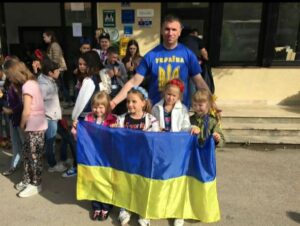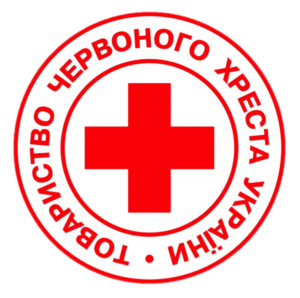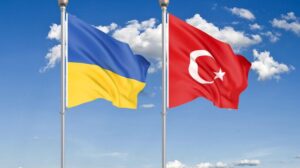
On the eve of Kurban-Hayit, a group of Ukrainian children arrived in Tashkent for rest and rehabilitation at the invitation of the Uzbek side.
The group includes children from regions of Ukraine affected by the war, including Kharkiv, Kherson, Mykolaiv, Zaporizhzhia, Sumy, Khmelnytskyi, Lviv, and Kyiv.
Over the course of 12 days, the children will undergo a program of health and psychological support.
Each day will be dedicated to a separate theme, from National Traditions Day to Sports and Health Day, with creative competitions and educational excursions.
The humanitarian mission aims to help children restore their inner balance and forget about their worries and shelling, at least for a while.
The children and their escorts were greeted with a ceremony at Tashkent International Airport, after which they left for a health camp in the foothills of the Tien Shan mountains.
Almost all relevant ministries and agencies of Uzbekistan are involved in the implementation of the program.

“In January-September 2024, DTEK Energy invested over UAH 2.3 billion of its own funds in the repair and restoration of thermal power plants (TPPs).
According to the company’s press service, its goal is to restore as much capacity as possible that was damaged or destroyed as a result of numerous enemy attacks on the energy sector to ensure a more reliable heating season.
As reported earlier, DTEK Energy plans to invest about UAH 3.9 billion in the repair and restoration of TPPs in 2024, which is in line with last year’s investments.
Since the beginning of the full-scale Russian invasion, DTEK Energy’s TPPs have been attacked by the enemy more than 190 times. As a result of the attacks, 56 power engineers were injured and three were killed.
In March and June this year alone, the enemy carried out seven massive attacks on the company’s TPPs. The shelling destroyed or damaged about 90% of DTEK’s thermal generation capacity.

Minister for Foreign Affairs of Ukraine Andriy Sybiga met with Croatian Foreign Minister Gordan Grlic Radman in the framework of the Ukraine-South-Eastern Europe Summit, informed his Croatian counterpart about the situation on the battlefield and outlined Ukraine’s key defense needs.
“The Ukrainian Foreign Minister expressed his gratitude for the medical rehabilitation and recovery of Ukrainian defenders and their families in Croatia. This year alone, more than 800 children of Ukrainian servicemen have already been rehabilitated in Croatia. The ministers discussed the continuation and expansion of these programs,” the statement reads.
Sibiga also praised the solidarity of the Croatian side, in particular the leadership in assisting in the humanitarian demining of the territories liberated from occupation and the restoration of damaged energy infrastructure.
The Foreign Minister emphasized that Ukraine appreciates Croatia’s support for efforts to prevent the election of Russian representatives to the governing bodies of international organizations, including the Executive Council of the Organization for the Prohibition of Chemical Weapons. Sibiga also emphasized the importance of Croatia’s participation in the Ministerial Conference on the Human Dimension under the fourth point of Ukraine’s Peace Formula, “Release of all prisoners and deportees,” which is scheduled to take place in Canada in the near future.
In his turn, Grlić Radman emphasized Croatia’s readiness to continue to consistently support Ukraine in defending its sovereignty and territorial integrity.
The Croatian minister assured of the readiness of Zagreb to further assist Ukraine on its path to joining the EU and NATO.
The parties agreed that Croatia’s experience of joining the EU is important for Ukraine and discussed the provision of relevant expert support.

Croatia will host 100 children of wounded and killed Ukrainian soldiers for rehabilitation in the fall.
According to the Honorary Consul of Ukraine in Split (Croatia) Ivica Pirić, Croatia has been organizing recreation for Ukrainian children by the sea since 2015 with the organizational support of the Embassy of Ukraine in Croatia and the Prime Minister of Croatia. Over the 9 years of the program, which is funded by the Ivica Pirić Foundation, 3.5 thousand Ukrainian children and 400 combatants have visited the seaside city of Split in Croatia.
“In 1991-1995, Croatia went through a war in which more than 20 thousand people died and thousands of soldiers became disabled. Much of Croatia’s territory was mined, and cities and towns were heavily damaged. Many IDPs had to go through a difficult period of reintegration. Croatia has extensive experience in treating and rehabilitating military personnel and treating post-traumatic stress disorders in children. The current generation of Croats, including government officials, are children of war, and they are very close to the problems that Ukraine is facing today, so we want to help. The least we can do is to give a holiday by the sea to the children of Ukrainian heroes who are defending Ukraine’s independence,” Pirić said.
In October 2023, Ukraine and Croatia signed an agreement on cooperation in the field of demining, which provides for training of specialists, surveying of territories, their demining and clearing, and exchange of experience in the production of demining equipment. According to the Ministry of Economy of Ukraine, Croatian demining machines are operating in Ukraine, and in mid-2023, Ukrainian and Croatian manufacturers agreed to localize the production of such machines in Ukraine.
Pirić is a Croatian footballer who has been working as a FIFA agent since his retirement. Since 2016, he has been the Honorary Consul of Ukraine in Croatia. Pirić helps wounded Ukrainian soldiers and children affected by military operations.

More than a thousand families have received monetary assistance from the Ukrainian Red Cross for rehabilitation.
“1,196 families from Kiev and Mykolaiv have received monetary assistance from the Ukrainian Red Cross for the rehabilitation of children and adults totaling more than 35 million hryvnias,” the Ukrainian Red Cross said on Facebook on Thursday.
The Ukrainian Red Cross provided cash assistance to patients undergoing rehabilitation at the National Children’s Specialized Hospital of the Ministry of Health of Ukraine “Okhmatdet” in Kiev and several rehabilitation centers in Mykolaiv under the Cash for Rehabilitation program supported by the British Red Cross. Each patient under the program received 30 thousand hryvnias.
“This amount was determined based on the results of a preliminary survey among families whose children or relatives are undergoing or need physical rehabilitation in medical institutions of the country, in particular, in the Okhmatdet hospital in Kiev and institutions in Mykolaiv,” said Elena Skrypnikova, head of the Innovative Financing Department of the Ukrainian Red Cross.
According to her, the categories of injuries and illnesses for which monetary assistance is provided have also been defined: rehabilitation after wounds received as a result of hostilities or the action of explosive objects; rehabilitation services due to congenital diseases; rehabilitation due to chronic diseases, in particular, oncological, cardiovascular and others.
The majority of children and adults who received cash assistance already have disability status or are in the process of obtaining it. In addition, families surveyed indicated a need for auxiliary aids such as wheelchairs, walkers, hand or foot orthoses.

Deputy Minister of Defense of Ukraine Natalia Kalmykova and Ambassador of the Republic of Turkey to Ukraine Mustafa Levent Bilgen reached an agreement on cooperation in the field of rehabilitation of servicemen at a meeting.
“We are very grateful for the assistance provided to Ukraine by the Republic of Turkey. Now the list of such assistance has been expanded to include cooperation in the rehabilitation sector. A pilot project for the rehabilitation of military personnel has recently been launched. Its goal is to create an effective rehabilitation space with the participation of civilian and military health care facilities, social services, and local governments,” Kalmykova said.
As reported, the pilot project envisages, among other things, the creation of centers of excellence – institutions that will take the lead in rehabilitation.